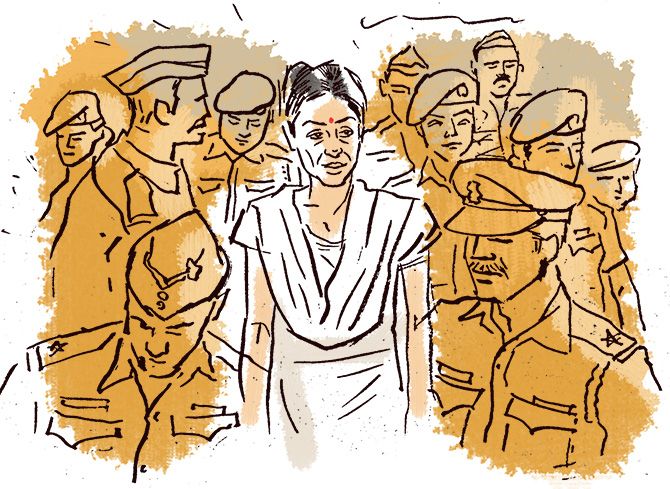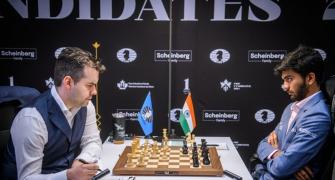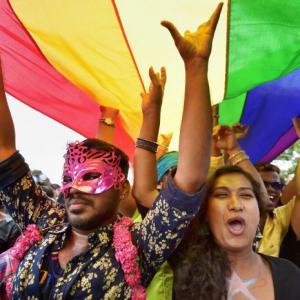Ever since Indrani's bail plea was denied by the judge her security has been stepped up.
The message was clear. If she felt that unsafe she could get all the security she needed.
But in jail she stayed.
Vaihayasi Pande Daniel reports from the Sheena Bora murder trial.
Illustration: Dominic Xavier/Rediff.com

Domnic Machado still has the Rs 70,000 Sheena Bora gave lying with him.
It is probably sitting in a bank in Marol, north west Mumbai.
Seven years later it would be worth approximately Rs 130,000, almost double, if one counts both interest and its inflationary increase.
He wasn't ever able to give it back to her.
She never claimed the amount because she was dead and he had no legal way of handing it over to anyone.
Machado, along with his wife Melanie, were Sheena's landlords.
He first met Sheena in 2011.
That year husband and wife duo, Mr and Mrs Rahul Mukerjea approached the Machados, through their agent Aslam Reshamwala, to rent a small flat at Lok Raunak Apartments, Bori Colony, Marol.
In September the deal was struck.
Sheena, Rahul (Peter Mukerjea's son from his first marriage), Domnic and Melanie signed on a two-year rent agreement of Rs 18,000 per month for the flat, with a deposit of Rs 70,000.
Sheena also gave them 24 cheques drawn on a Guwahati branch of HDFC Bank. The deposit, it seems, was handed over in cash.
Sheena and Rahul happily moved into Lok Raunak with a Maruti Alto, with WB registration plates, remembered Machado.
The year 2011 was the last time Machado saw Sheena too, probably.
When in mid-2012, Rahul moved out, Machado didn't realise Sheena was missing. Nor apparently did her 'husband' Rahul.
It wasn't until 2015 that he realised his pretty, young tenant, whose money he still had, was murdered.
Domnic Machado recounted on Monday, September 10, the extraordinary saga of his mysteriously disappeared tenant to CBI Special Judge Jayendra Chandrasen Jagdale in Courtroom 51, Mumbai city civil and sessions court, Kala Ghoda, south Mumbai, where the Sheena Bora murder trial has been unfolding since early 2017.
He told the court, through his testimony, that he first got to know that Sheena had "gone" from Mumbai when he received a call from Rahul.
Speaking in English to Judge Jagdale -- the first witness in this trial to do so -- Machado, 40, was a fairly tall, sturdy-looking man, slightly balding, clean-shaven, with intense eyes and a superior English diction.
On Monday, nothing was lost in translation.
CBI Special Public Prosecutor Bharat Badami asked questions to Machado in English. Machado answered in English. The judge dictated to the court stenographer his evidence in English too, for the record.
After 18 months of attending court there is much, one has learned, about Mumbai police investigations that suffer for the language barrier, since Marathi is the language of record for the city's force.
The defence can legitimately rail against a witness for omissions or contradictions in facts between the statement s/he gave the police and what s/he said in court.
And s/he, the witness, might, legitimately, have no answer.
Statements made to the police go through the wringer three times -- the witness gives his statement often in Hindi or English to the police; it is translated and written down in Marathi; it is then verbally translated back and explained to the witness and s/he signs.
The witness is subsequently held responsible for what a policeman/woman has interpreted in Marathi of her/his original Hindi/English statement, made often many years before.
Add to that the fact that the judicial record is in English and what a witness says in Hindi or Marathi in a trial is translated into English.
So when the English version of a witness's testimony in court is compared with the Marathi version of the original statement by the witness to the police, are not there bound to be crucial differences? Can that be a surprise?
Isn't the witness's reliability also the victim of translation?
Machado was semi-formally dressed, in spite of the year's second wave of heat, in a dark purple, long-sleeved shirt, black trousers, black belt, black shoes and a black strap watch.
The man from Marol was perhaps the most self-possessed witness to take the stand in this trial, not crumbling under cross examination, answering questions smoothly throughout, with a direct gaze, in a clear tone, his hands laced behind his back or held together in front of him, nor hesitant to acknowledge when he could not recall something.
His occasional confessions, that he couldn't remember some fact or date was not said even a tad apologetically, in the sheepish manner that other witnesses who had occupied the stand had exhibited.
Machado matter-factly declared he had no recollection of a particular detail or another that was being asked, without making those tell-tale gestures of uneasiness like scratching an ear or the back of his neck or shifting position uncomfortably.
"In July 2012 Rahul Mukerjea contacted us and said we want to terminate the agreement and vacate the (Lok Raunak) flat. I asked him about Sheena. He said she has gone for further studies to the US. I asked him that she has not informed us that she is leaving for the US."
"Rahul Mukerjea said she went all of a sudden and 'I got a message from her side stating that she is going to the US'."
Puzzled that Sheena had taken off so abruptly for foreign shores, Machado was supplied a few additional, equally baffling, details.
Rahul told him, he said, that 'Even her passport is with me.'
Machado wondered how she could have gone to America without a passport.
"He (Rahul) said Sheena's mother has influence and she can (even) get a duplicate passport and send her to the US."
Rahul enquired from Machado about their deposit. He wanted it to be refunded.
"We told him it is a joint agreement and it requires Sheena's presence and her signature. Thereafter, he was still insisting on (getting the deposit). He said he was in a bad financial condition and he wanted to leave the place as soon as possible."
"We told him without Sheena we cannot give the deposit amount."
Machado remembered that Rahul explained that he was unable to get in touch with Sheena -- his wife (!) -- and passed on "one UK number" for Sheena's mother and also her brother Mekhail Bora's Guwahati number.
"My wife got in touch with the UK number. And a lady on the other end said she was Indrani (Mukerjea). She (my wife) introduced herself and said Sheena and Rahul were staying in our (rented flat)."
"My wife told her that Sheena has left our flat without informing us and we require a termination of her letter of agreement from her, as well as a no objection (letter) to give the deposit to her husband Rahul. She said 'Contact Mekhail. He will do the needful'."
After a conversation with Mekhail, a termination letter, signed by Sheena, arrived via Blue Dart couriers from Assam.
Machado said it was "not satisfactory" because it seemed to be a scanned copy and the signature on it "was not matching" the signature he had on the agreement of Sheena's.
Rahul called to check if the letter had been received and was told the problem. He once again asked for the deposit to be returned.
"We told him we will return it in presence of Sheena and her signature."
As a precaution, Machado said, they informed the MIDC police station, Andheri east, north west Mumbai, where the rent agreement was registered, by letter, of their position, stating that they could only refund the deposit in presence of Rahul and Sheena.
The matter of the absconding tenant and her lingering deposit ended there.
The Machados didn't hear anything further from Rahul or the Boras. The Rs 70,000 remained with them, accruing interest no doubt.
Out of the blue in "October 2015", Machado said, the Khar police visited their residence.
Given that the startling news of Sheena's murder had already broken in late August, the Machados were probably expecting any day to hear from the police. He didn't mention that to the court though.
The police, when they arrived, spent about six hours, Machado remembers, at their Marol home. They collected a bunch of documents including the leave and license agreement, its cancellation and the balance uncashed 12 to 14 cheques Sheena had made out to the Machados.
A panchnama (a statement recording evidence) was drawn up and Machado and his wife signed on it. As did the police.
CBI Special Public Prosecutor Bharat Badami: "You were there?"
Machado, looking astonished: "Yes."
Badami: "A copy (of the panchnama) was given to you?"
Machado, squinting his eyes slightly, to comprehend the question: "Yes."
Badami requested him to have a look at that panchnama to identify it.
Raising his eyebrows fractionally, as he studied the document, he finally agreed it was the right panchnama and bore his and his wife's signature.
The prosecutor: "Kindly see the date."
Machado: "September 2, 2015."
Badami corrected him saying that was when the police station received it and asked him to look for the date of when the panchnama was prepared.
Machado: "September 1, 2015."
Badami: "Not October, na?" In his testimony Machado had said the police visited him in October.
Indrani's lawyer Gunjan Mangla scrambled to her feet to object: "He has already given an answer (earlier)!"
Judge Jagdale patiently assured her, smiling: "I will take it down how it is happening", adding that he would mention that the actual date was pointed out to the witness, by the prosecution.
Badami: "I am obliged."
Mangla retorted, correcting him: "The court is obliged!"
Laughter. The judge laughed loudest.
Badami, cutely: "I am obliged too."
The prosecutor, nearly finished with Machado's testimony, asked him when the CBI had been in touch with him for their subsequent investigation. Machado said he did not remember the exact date, but it was about two months later.
Mangla told the judge she would not conduct Machado's cross examination and Indrani's senior lawyer Sudeep Ratnamberdutt Pasbola was scheduled to do so. He was held up at the Bombay high court in a bail hearing but would be along shortly.
Nearly an hour elapsed as the lawyer was awaited.
In the interim, in the courtroom, and in the hallways outside, conversation dwelled on the news and possible motives for the HDFC Bank executive's murder, which was confirmed on Monday. And on the Bombay high court's discharge of all the five police officers in the Sohrabuddin Sheikh and Tulsiram Prajapati alleged fake encounter trial.
News had arrived that the police were planning to make an announcement about the Siddharth Sanghvi murder at close to 5 pm on Monday.
Was it a case of robbery? Or professional rivalry? Was alleged accused Sarfaraz Shaikh another contract killer possibly like the Mukerjeas' former driver Shyamvar Pinturam Rai?
The courtroom and the hallways were milling with more than its usual quota of police and guns.
Pasbola arrived closer to 4.15 pm and began his cross examination of Machado.
It was smooth. Uncomplicated. The exchange between the witness and the lawyer was respectful, if rather loud, and slightly reminiscent of a Hindi film court scene, because of its volume and the impending sense of suspense with which Pasbola prefaced each question with a dramatic, ringing "Mr Machado."
But the Suspense never delivered. It was a somewhat tame show.
Machado was the kind of witness Pasbola should have liked, because he never shied away from looking squarely into the lawyer's forbidding face each time he answered a question, even tricky ones. He was not evasive or skittish, his eyes never nervously skittering off, absconding from making contact.
Pasbola spent about 40 minutes cross examining Machado.
He started off asking: "Mr Machado, how many days before entering into an agreement with Rahul and Sheena, did you meet them?"
Machado: "Ten or fifteen days prior to the registration of the agreement we had met Sheena. And we met Rahul and his mother (Peter's first wife Shabnam Singh)."
A few minutes later, Pasbola: "He (Rahul) represented them as husband and wife and you allowed them to reside (together)?"
Machado nodded.
The advocate, after that, through a series of questions attempted to establish why Machado had not been suspicious of the total disappearance of his tenant, virtually overnight.
Hadn't he wondered where she had gone and found it odd that she had vanished into thin air?
Did he not think to inform the police?
Didn't he wonder who the Influential Mother was who could get passports duplicated?
Did he know Sheena's mother was Indrani prior to Rahul calling to terminate the agreement?
Did he have Sheena's e-mail address?
Machado, unperturbed, answered these questions about his rentee all in the negative, except the last.
Pasbola queried that when Rahul contacted him in July 2012 "till that time you did not know that Sheena was not residing in the flat?"
Machado in a definite voice, shaking his head: "No."
Pasbola also uncovered the fact that the deposit for the flat was still parked with the Machados. Should the deposit have been given back, you wondered? And to whom? What happened to the car?
As per Machado's reading of the situation he concurred with Pasbola's assessment that Rahul was "very desperate" to get the deposit money back but since a statutory notification was never finally issued from Rahul's side the deposit was not returned.
In passing, Pasbola popped an odd hook-ball question at Machado: "Do you know Abbas Ghani Sheikh?"
Machado, calmly but doubtfully: "Not that I know of."
Google has not explained who Sheikh is either, yet. Time will tell.
The lawyer spent longer stretches pinning down Machado for three crucial inconsistencies.
There was the one that Machado had already walked into -- believing that the Khar police had visited him in October instead of September. That is neither here nor there. A straightforward witness may not have perfect memory.
The second point: Was it Machado who spoke to Indrani in the UK? Or was it his wife? In his testimony to the court he said that Melanie Machado had spoken to Indrani. But that was not reflected in his earlier statements.
Machado was emphatic when he said he had not spoken to Indrani though he looked a bit discomfited with the query, rubbing his nose.
The defence lawyer laboured the longest over the visit the Machados received from the Mumbai police in 2015.
Had it been constables or inspectors from the Khar police station, north west Mumbai (who were initially handling the case)? Or from the Bandra police station?
Did he know a man named "PI Pawar of Bandra police station?" Had Pawar come to his home or/and an Inspector Kamble?
Machado kept insisting he had been visited by the Khar police and he knew no Pawar.
Finally, Pasbola showed him his statement to the police and asked if he understood Marathi.
Machado didn't. The relevant portion was translated. His and his wife's signature at the end again and the seal of the Bandra police was pointed out to him.
Machado's face broke into a grin and with a faintly bemused but amused expression, he looked from Pasbola to Badami. Pasbola laughingly told him not to look at Badami.
Acknowledging his error, added a trifle lamely: "They had told me they were from the Khar police station..."
The accusations with which Pasbola concluded his cross-examination were, if not earth-shattering, significant.
He levelled the charge that neither Machado nor his wife had ever spoken to Indrani in the UK.
And that Machado had been mistaken, for some unknown/bizarre reason, in thinking Khar police station personnel had visited his home when it was the Bandra police.
What was more perplexing were some of the missing questions from Pasbola. And missing sequences from Badami.
Why didn't Badami ask Machado about receiving a copy of the cancellation of the leave and license agreement also from Indrani's office (unknown to him, via Indrani's then secretary Kajal Sharma) in 2015?
Or about Rai coming to deliver that document and taking his signature, which was part of Rai's testimony last year?
Was there some reason for its omission? Why didn't Pasbola ask about it?
Nowhere in Mekhail's testimony did a mention of Sheena's non-matching signature on the cancellation of the leave and license come up.
Or the fact that Rahul had put Machado in touch with Mekhail.
Or if the Machados knew that Rahul and Sheena were married.
And why the build-up about Rahul needing money so direly by both sides? Wasn't it odd that Rahul came with Sheena and Rahul's mother to the flat initially?
The next witness is expected only after Lord Ganesha arrives in the city with pomp and departs.
Pasbola suggested they have the next hearing on the 14th. But Badami amusingly said something to the effect that there would be delays because "Someone will have to visit their uncle's Ganpati and the next day their nephew's Ganpati and the next day their galli's Ganpati..."
Indrani, Peter and Sanjeev were given 15 minutes to meet with their lawyers, as it was already 5.15 pm.
Then the trio departed, followed by 16 to 20 or more police personnel.
Indrani, still wan but more lively on Monday, floated down the stairs and across the courtyard to the jail van, in her wispy, white kurta ensemble, like a tribal queen, in the centre of 16 women and men cops -- the placid eye of a swirling khaki hurricane.
As you viewed Indrani from the window above you couldn't help observing how peculiar it all was -- people's lives, human nature, fate etc etc etc. Or not remember the crash-burn-resurrection-imbued twists, turns and U-turns of Indrani Pori Bora Das Khanna Mukerjea's strange but vivid life.
How would it all end? Your guess is as good as mine, a year-and-a-half later.
A casual bystander viewing the Indrani-departs-for-jail scene would wonder who this woman was, who was being guarded by 16 policemen? Was she that violent? Or that dangerous? Or that important?
Ever since Indrani's bail plea was denied by the judge last week her security has been stepped up even further.
The message was clear. If she felt that unsafe she could get all the security she needed.
But in jail she stayed.
- MUST READ: The Sheena Bora Murder Trial










